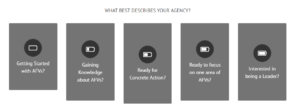
Efforts by state and regional transportation agencies to increase the use of alternative fuel vehicles (AFVs) face challenges similar to problems experienced by other public agencies. Shifting political priorities make it difficult to implement consistent policies over a long period. In addition, flexible and innovative policies must account for rapidly evolving technology and changes in societal needs. A policy framework must address these challenges for transportation agencies to develop and implement activities that advance AFVs in a way that benefits the public.
Before committing public resources to an activity, government agencies must focus their attention on three inter-related areas: public value, internal capabilities, and legitimacy and support. These three areas create the a conceptual framework, adapted from basic principles of business strategy, for realizing change in the public sector.
State and regional transportation agencies must create a public value proposition for AFVs that fits within their mission or charter. The agency must also assess its internal capabilities to realize this proposition. Finally, the agency must gain external legitimacy and support for action to support the value proposition. These components affect each other, as denoted by the two-way arrows in the public value triangle. For example, a financial incentive to purchase an AFV by the state can validate the public value proposition and bolster the external legitimacy and support of action on AFVs.